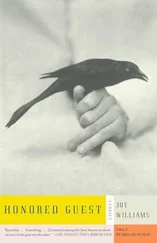“But …,” Grady repeats distantly.
“Suddenly in the last moments of the trial, the door opened and another soldier, as unappealing as the others, strode into the room. He bore a striking and uncanny resemblance to the prisoner in the dock. The real husband had returned at last and all present sadly recognized him for he had lost none of his cruel and dour bearing. The prisoner admitted to the deception and was duly guilty of imposture, falsehood, substitution of name and person, adultery, rape, plagiary and larceny.”
Grady stirs beside her. “Imagine that,” he says. “1500. Things like that wouldn’t happen today. People aren’t as …” He laughs. “Women aren’t as thoughtful.”
“He was put to death,” the girl says. “She murdered him. The father of her son. And she had loved him, but only in thinking that he was another. Touch, word, act, daily passion and affection meant nothing you see. It wasn’t even a matter of fidelity.”
“What became of her?”
The girl shrugs. “Stories stop,” she says.
“But I must draw a conclusion from this?” he says slowly, puzzled. “There is something that applies? There is you and me and the third who always walks beside us?”
The girl rattles the ice cubes in her empty glass. Unseen, the hounds are baying again in the woods. They are famous hounds. She can feel them. They race across the tightening band that grips her head. They are eternal and usually sleeping, but they have always awakened to seize the souls of the dead if one happens to lament them too loudly or too soon.
“Who is to be accused of imposture in our trinity?” Grady asks playfully.
The hounds are hurting her head. They run and run. She rubs her head with an ice cube. “I don’t know,” she says. “I want to tell you about Daddy.”
THERE ARE NO HOUNDS in the vicinity of the sorority house. The housemother has a dog but it is a cocker spaniel. It lacks both voice and genitalia. The housemother had the veterinarian remove its bark and compromising organs. It hardly seems a dog. It is more of an experiment that is still going on.
The housemother lives in the sorority house. Her significance is unknown. She seems useless and unpleasant. She is so lame and arthritic that she cannot walk up to the third floor where the girls sleep in their bunk beds. She cannot climb to the second floor where the girls’ desks and record players are, where their bright new clothes hang in the closets. She cannot see well, she lacks any real authority. Nonetheless, everyone hates her. In the dining room where she shows her fine upbringing by eating very tiny quantities of everything, she moves her fork in and out of the food many times before she brings it coyly to her lips. Her stomach is round. She is full of fluids, gases and tumors. Burps and bubblings come from her corner of the room. She likes to say cruel and pointed things to the girls, things that will embarrass them, but it takes hours to think of the words, sometimes days. The proper moment never comes.
Once this woman was married but her husband expired a long time ago. She looks upon those years without much interest. She has never been in love. The girls have boys to love them, sometimes several in a single year. Despite this difference, the housemother is similar to the girls in many ways. She cherishes Kahlil Gibran, just like them. When bathing, she soaps her breasts carefully, as though they could still be useful to her.
If she were younger or if someone had ever loved her, she would be able to do more harm.
One evening at dinner, she finds herself seated beside a girl she has not seen for quite some time. She has never liked this girl and in the midst of spooning Dream Whip on her pudding, she realizes, quite strongly, that the girl has been up to something rotten in her absence. The housemother has never feared her intuitive powers. On the contrary, she has always welcomed and used them. She takes a bite of pudding and says,
“I know your background and I am sure that those who love you would be very ashamed at your recent behavior.”
That, she is sure, will cover it for the time being.
Oh, this is the animal that never was …
Of their love they made it, this pure
creature. And they left a space always,
till in this clear uncluttered place,
lightly he raised his head and scarcely
needed to be.
Rainer Maria Rilke
Sweet Grady gave me a feeler gauge. I’ve had it with me all this night in the pocket of my hip-hugger pants. The pants are tight. It’s left a mark on my leg, like a burn, where it’s been chafing. I take it out and hold it safely. If Grady were here, I would laugh with him, I would say, “The answer is 1-5-3-6-2-4 and what is the question?” And he would know. He would say that it is the firing order of the cylinders. Such a game would delight him. Crazily, he would think that by knowing things he would know himself better. He would be so happy, proud of his hands and his quick bright head.
There’s blood on my hand. I don’t mean to appear overly dramatic but there is blood on the palm of my hand, the one I grasped the fence with on my wedding day. I’ve always favored it. I disconnect the radio and go into the bathroom. A sister has just left it. The toilet is still running. Burnt matches float unflushed. They think that sulphur masks it. They’re always thinking here. For example, they’ve planted lemon trees over the septic tank and grease traps. Still, one can’t help but sniff. Childlike absorption with the barnyard.
I go to the faucets. My hand drips a little. I drop the gauge to suck on it and of course the worst happens — the gauge falls down the drain and disappears.
On the balcony, Cords and Doreen sit, sometimes hugging. There is a fountain beside them, two feet tall of marble, a lion’s head with a sealed tube for a tongue, the tile basin all fuzzy green from the rains. They’re there each dawning. This is what they were doing the dawning of the day I began the baby, the day the train bore Daddy down, the day that brought the night my Grady held me for the first time. I turned away. I’d seen it before. Cords dropping her hand down Doreen’s spine. Dropping her hand in a rubber glove so tight that you could see the smashed cuticles all bunched behind it. They’re doing it now. All those months gone by. The hand pats Doreen’s bottom. The hand travels up again. I try not to listen to them. They’re saying the same thing. Corinthian Brown is walking down the street outside on his circuit to Glick’s and Cords is calling him Pellicle Pete. This is what I heard once. This is what I hear today.
“Pellicle Pete,” she sings softly, “you wanna come up and help the girls make brownies?”
I turn away and try to listen to Grady instead but everything gets in the way. All that’s happened. The words. The Jaguar planing through the woods. Do you understand? I enjoyed it thinking I was dead. But I tried to hold his hand. Not to hold him back. To let him know … I was with him. But my touch. It seems my touch got in the way. It tampered with the angle.
I listen but he is not saying anything to me any more. He has stopped. There is just the sound of his breath sprinkling from his sides. His face is so fragile. It is as though they have strung small pale bulbs beneath his skin. The color blue, the wattage fifteen. His sex is raised and swollen beneath the sheets, pulsating beneath the sheets. It’s cool. I could wrap my hand, my lips, around it. A glass of water …
I wish I were not so thirsty and famished all the time. I would like to starve to death. If only more foodstuffs were like bananas I would be on my way. I’ll tell you I’ve never been able to eat a banana. The thought that a male banana tree and a female banana tree are necessary to produce little bananas has always upset me. I never eat anything that has been born or pollinated. If this were only so! It’s true I’ve tried it off and on. I only lie when I am very tired . I want to starve to death but the hunger, the hunger … Ninety pounds. Then less. A child weighing no more than an empty trash can. Then to barely toddle. Then six pounds at birth. I would be present at my birth …
Читать дальше












